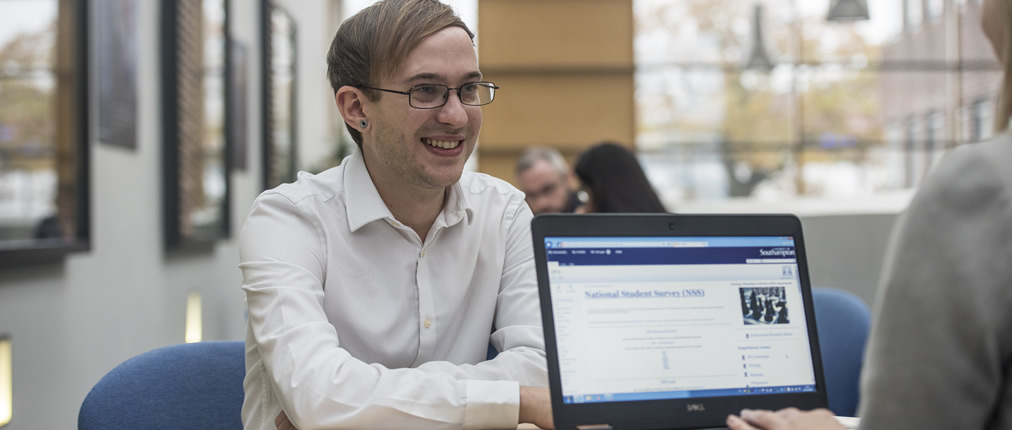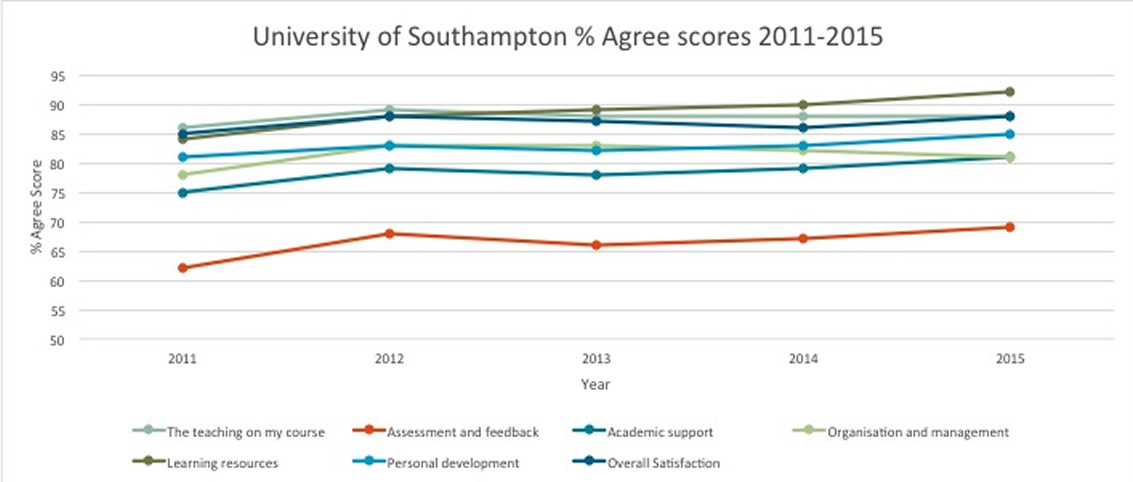Hartley News Online Your alumni and supporter magazine
Pete Clarke, Market Intelligence Research Analyst in Strategy, Planning and Analytics, leads the coordination of the University’s National Student Survey (NSS) activity. The 2016 survey will be launched to our students in early February.
What difference does the National Student Survey make?
It is all about the student experience. It’s not just a numbers thing, which is sometimes how it is perceived. It helps us to understand whether our students are actually getting what they want out of their time here.
Across the University, we take the comments students make in the survey extremely seriously. They are a powerful driver for positive change in the student experience both locally and institutionally as they give context to the quantitative scores, providing the type of information that a Faculty can respond to.
In every Faculty there is someone on the senior team who reads every single comment their students have made. While I provide a large amount of reporting and benchmarking for each Faculty, they also do a lot of work at a local level grouping the comments into themes, helping them as a senior team understand the experience their students are having in a more detailed way.
I’m delighted that our new Vice-Chancellor has also committed to reading every comment in the survey, as I understand he did in his previous institution.
How good are we at telling students what we do in response to NSS?
We’ve done some research that focused on what works best in ‘You said, we did’ campaigns at other universities. This showed that institution-wide messages are less effective than campaigns which were driven out of Faculties, as students recognised the changes. While it is hard to be sure of the relationship between the two, we also saw that where universities did these campaigns well, they achieved improvements in their NSS results.
This year we are working more closely with Communications and Marketing and the Faculties to draw out those local messages and communicate them to the student community. We will publish them on a dedicated website in the build-up to the 2016 NSS.
Any student-facing staff member can help with the NSS by talking to their students about it and about the fact we listen to the feedback. This is proven to be more powerful than a simple ‘please complete it’ message.
Why is the quantitative information important?
First and foremost, there is the importance of the NSS for our reputation. NSS scores have a massive impact on UK rankings, particularly the Guardian league table, which the University has taken a decision to focus on (along with QS for international rankings).
The research we have done shows that regardless of everything else, if you improve your NSS rankings then you improve your league table position. We have seen that this year, with improved performance, we also saw our position rise in all the major rankings.
University of Southampton overall % agree scores by question area for the NSS 2011-2015 (above)
Where do we perform best and worst?
Historically we do very well in ‘learning resources’ across the faculties. This refers to the support around and outside of face to face lectures. This includes access to IT, the library and specialist equipment or facilities such as laboratories, if that’s relevant to the course.
Assessment and feedback has been our weakest area. This is typical across the Russell Group with Oxford and Cambridge tending to perform particularly poorly in this area. So in relation to other research-intensive institutions, we’re not unusual in having a weakness here.
We have made improvements with assessment and feedback, but there is still a long road to go to see our scores break the 90 per cent satisfaction mark.
How could we improve in this area?
Educating staff and students about good assessment and feedback is crucial.
Interns on the Feedback Champions Project, who conducted 100 interviews with our staff and students on this topic, published their findings on the key issues here.
Based on this research they also developed a whole site with information and resources for staff and students to try to improve education around what good assessment and feedback looks like, including a new virtual tool. You can access it here – and if you are student-facing, you might want to share it with your students.
What is the future for the NSS?
NSS will change significantly in 2017. We are actively contributing to the consultation that IPSOS MORI and HEFCE are running and we should know the new questions by August 2016.
It will shake up NSS as well as the league tables the NSS feeds into. It could potentially have a big impact on where we sit in those tables and what is considered important in higher education. For example, there may be new questions about employability and critical thinking. It is also likely that it will have a relationship to the Teaching Excellence Framework the government is expected to introduce as a new way of assessing quality.
You are part of the new Institutional Research team. What is the role of the team?
We are focussed on supporting decision making. We supply high level analysis, either at Faculty or University level. This could include benchmarking, bespoke analysis, market research or horizon scanning.
The team brings together colleagues from several different teams into one hub, focussed on helping the University make well-informed decisions.
There is plenty of information and data on our website – we publish every bit of data we can that is not confidential. If you need support or consultancy with primary or secondary institutional research, you can complete one of the proformas on the site. You can also email us at insres@soton.ac.uk

